Contets
Landmarks
Print Page List
2019 by Roger D. Launius
All rights reserved. No part of this publication may be reproduced or transmitted in any form or by any means, electronic or mechanical, including photocopying, recording, or information storage or retrieval system, without permission in writing from the publishers.
This book may be purchased for educational, business, or sales promotional use. For information, please write Special Markets Department, Smithsonian Books, P.O. Box 37012, MRC 513, Washington, DC 20013
Published by Smithsonian Books
Director: Carolyn Gleason
Creative Director: Jody Billert
Senior Editor: Christina Wiginton
Editor: Laura Harger
Editorial Assistant: Jaime Schwender
Edited by Gregory McNamee
Library of Congress Cataloging-in-Publication Data
Names: Launius, Roger D., author.
Title: Apollos legacy : perspectives on the moon landings / Roger D. Launius.
Description: Washington, DC : Smithsonian Books, 2019. |
Includes bibliographical references and index.
Identifiers: LCCN 2018032602 (print) | LCCN 2018037503 (ebook) |
ISBN 9781588346520 (eBook) | ISBN 9781588346490 (hardcover)
Subjects: LCSH: Project Apollo (U.S.)History. | Space flight to the moonHistory. | Space raceUnited StatesHistory. |
Outer spaceExplorationUnited StatesHistory.
Classification: LCC TL789.8.U6 (ebook) | LCC TL789.8.U6 L27 2019 (print) | DDC 629.45/4dc23
LC record available at https://lccn.loc.gov/2018032602
Ebook ISBN9781588346520
v5.4
a
To the memory of my favorite astronauts:
Pete Conrad (19301999) and Sally Ride (19512012)
Buzz Aldrin: There it is, its coming up!
Michael Collins: What?
Aldrin: The Earth. See it?
Collins: Yes. Beautiful.
Neil Armstrong: The Eagle has wings.
APOLLO 11 CREW IN CONVERSATION DURING MOON APPROACH, JULY 20, 1969
Contents

PROLOGUE

July 20, 1969
The astronauts who first landed on the Moon half a century ago carried with them the hopes and wishes of all whom they had left behind on Earth, as well as uncertainty about what they would experience on the lunar surface. Setting foot on another world, they knew, would be the climax of humanitys greatest adventure to date. Yet they betrayed none of this as they went about their work. They had trained for this mission. They had drilled for every contingency. In every way possible, they had worked to minimize risk. But risk there was, and they understood it, accepted it, and even welcomed it.
The lunar module (LM), code-named Eagle, that brought astronauts Neil Armstrong and Buzz Aldrin to the surface of the Moon that day was one of the weirdest-looking contraptions ever to invade the sky. A completely nonaerodynamic multisided box with the tensile strength of aluminum foil, floating with its gangly legs jutting out, it possessed neither symmetry nor grace. Mike Collins, piloting Columbia, the separate Apollo command module, above the Moon, referred obliquely to its awkward appearance as he joked to Aldrin and Armstrong, I think youve got a fine-looking flying machine there, Eagle, despite the fact youre upside down.
In the first of two maneuvers they undertook to reach the surface, Armstrong and Aldrin, strapped into Eagle standing up, descended to 50,000 feet. Next, if all went according to plan, Eagle would glide along a 12-minute computer-controlled descent to a point at which Armstrong would take over for a manual landing. But things didnt go according to plan.
As Armstrong and Aldrin descended to 6,000 feet above the lunar surface, a yellow caution light blinked. Then another came on, and another, and another. Even so, Steve Bales, the flight controller at NASA Mission Control in Houston who was responsible for the LMs computers, told the astronauts to proceed. It was just a 1202 program alarm, he reassured them. Collins could not remember the meaning of the 1202 alarm and looked it up as the lander continued down to the lunar surface, later recalling: My checklist says 1202 is an executive overflow, meaning simply that the computer has been called upon to do too many things at once and is forced to postpone some of them. A little farther along, at just three thousand feet above the surface, the computer flashes 1201, another overflow condition, and again the ground is superquick to respond with reassurances. Everyone has seen such problems with computers in the 21st century as well: the machine freezes up, going to a blue screen or a spinning beach ball. Such situations are irksome, but they are rarely perilous. If the computer helping to control the LM failed, piloting it would be more difficultand potentially dangerous for the astronautsbut that it turned out to be mostly an annoyance was thanks to the skill and cool-headedness of Armstrong and Aldrin.
The two descending astronauts spotted a landing site inside a large crater, but as they approached, the alarms continued, and they encountered a boulder field. Armstrong piloted Eagle away from the danger as Aldrin called out their steadily reduced altitude and range:
Altitude-velocity light. 3 down, 220 feet, 13 forward.Coming down nicely. 200 feet, 4 down. 5 down.Thats good. 120 feet.Theres looking good. Down a half, 6 forward.Lights on.Good. 40 feet, down 2. Kicking up some dust. 30 feet, 2 down. Faint shadow. 4 forward.Drifting to the right a little. Okay.
Then Aldrin uttered the first words ever spoken on the Moon: Contact light. By that, he meant that the sensor on one of Eagles legs had encountered the surface and triggered a light inside the lander.
Armstrong called Mission Control at 3:18 Central Daylight Time: Houston, Tranquillity Base here, the Eagle has landed.
Astronaut Charlie Duke, back at Mission Control, breathed a sigh of relief. Roger, Tranquillity, he said in his thick southern drawl. We copy you on the ground. Youve got a bunch of guys about to turn blue. Were breathing again. Thanks a lot.
The drama unfolded from there, Armstrong and Aldrin performing their scripted duties as the LM settled further onto the lunar surface. A few hours later, tasks complete, they opened the hatch, and Armstrong squeezed himself out and began to descend the ladder. Thats one small step for [a] man, one giant leap for mankind, Armstrong said as he moved one bulky white boot off the Eagles footpad. There would be debate about his precise phrasing: no one heard the a in a man at the time, and Armstrong later explained that in the excitement of the moment, hed misstated what he had intended to say, and he welcomed the bracketed insertion whenever the phrase appeared thereafter. Regardless of their exact form, these few words were Americas announcement, through Armstrongs voice, that it had won the competition that had consumed NASA for years. The two most powerful nations on Earth, the United States and the Soviet Union, had sought to extend their terrestrial control to the Moon, and the United States had used the Apollo program as a key diplomatic tool in the Cold War.

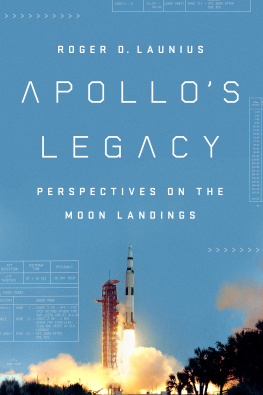

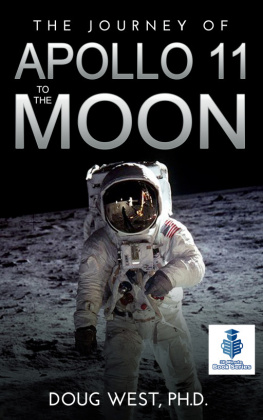
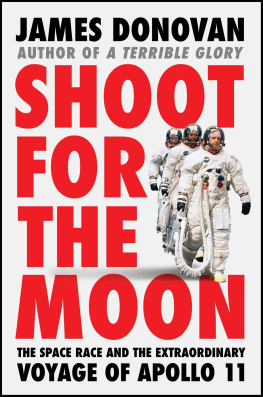
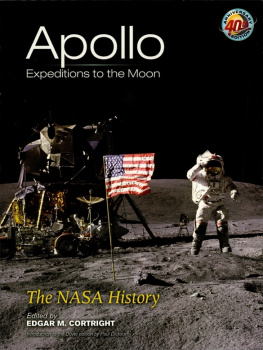
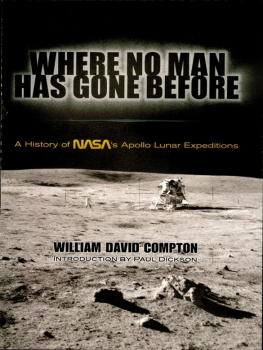
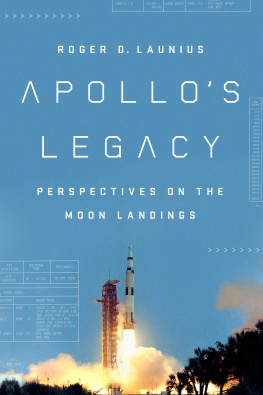
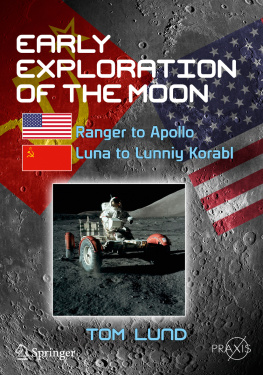

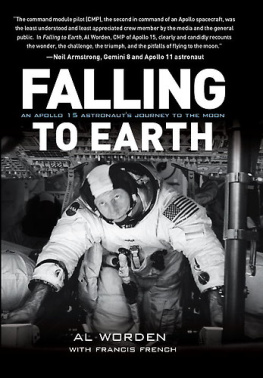
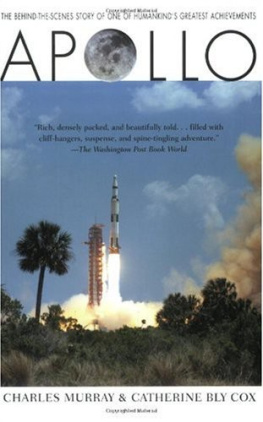
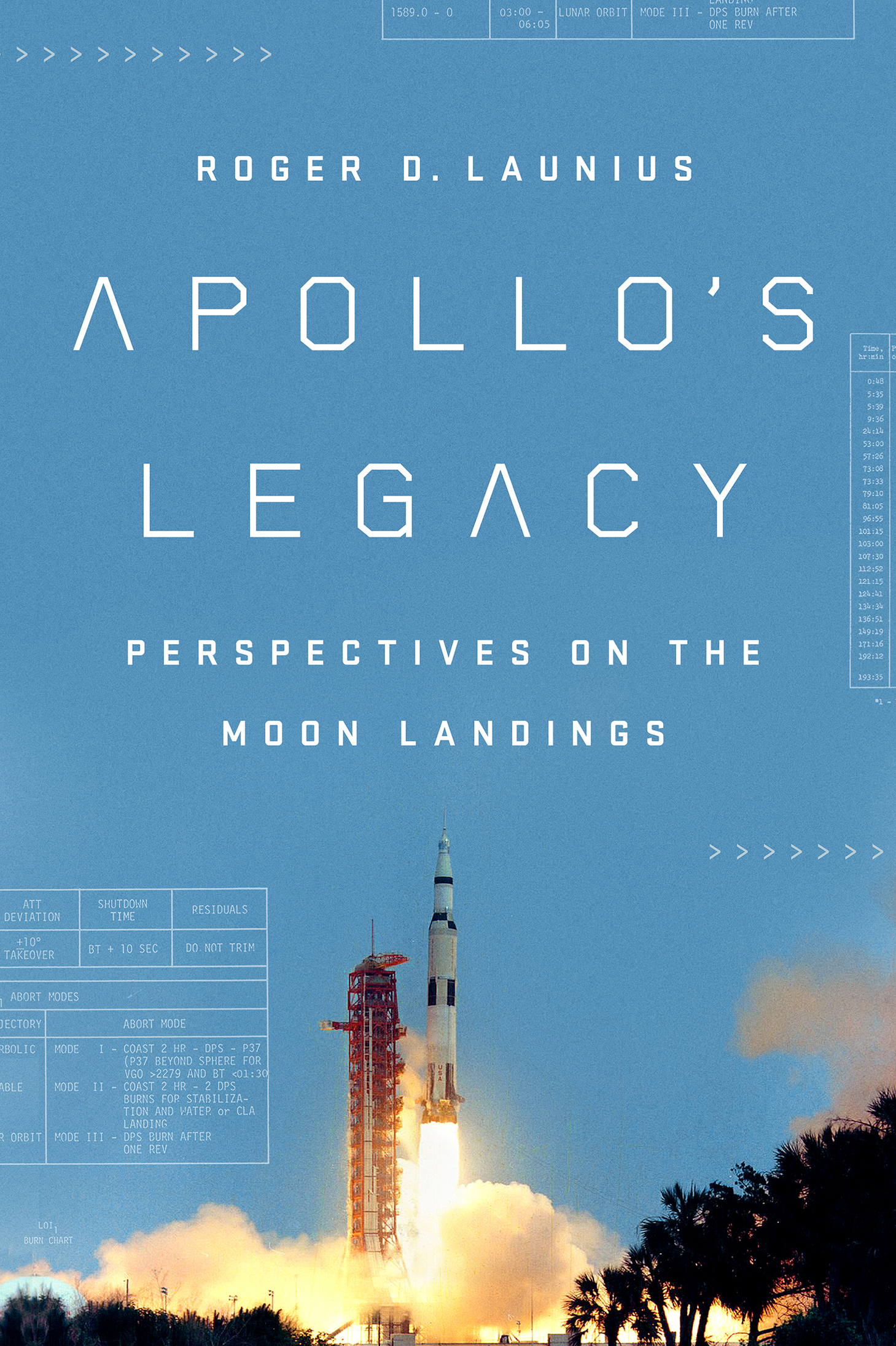
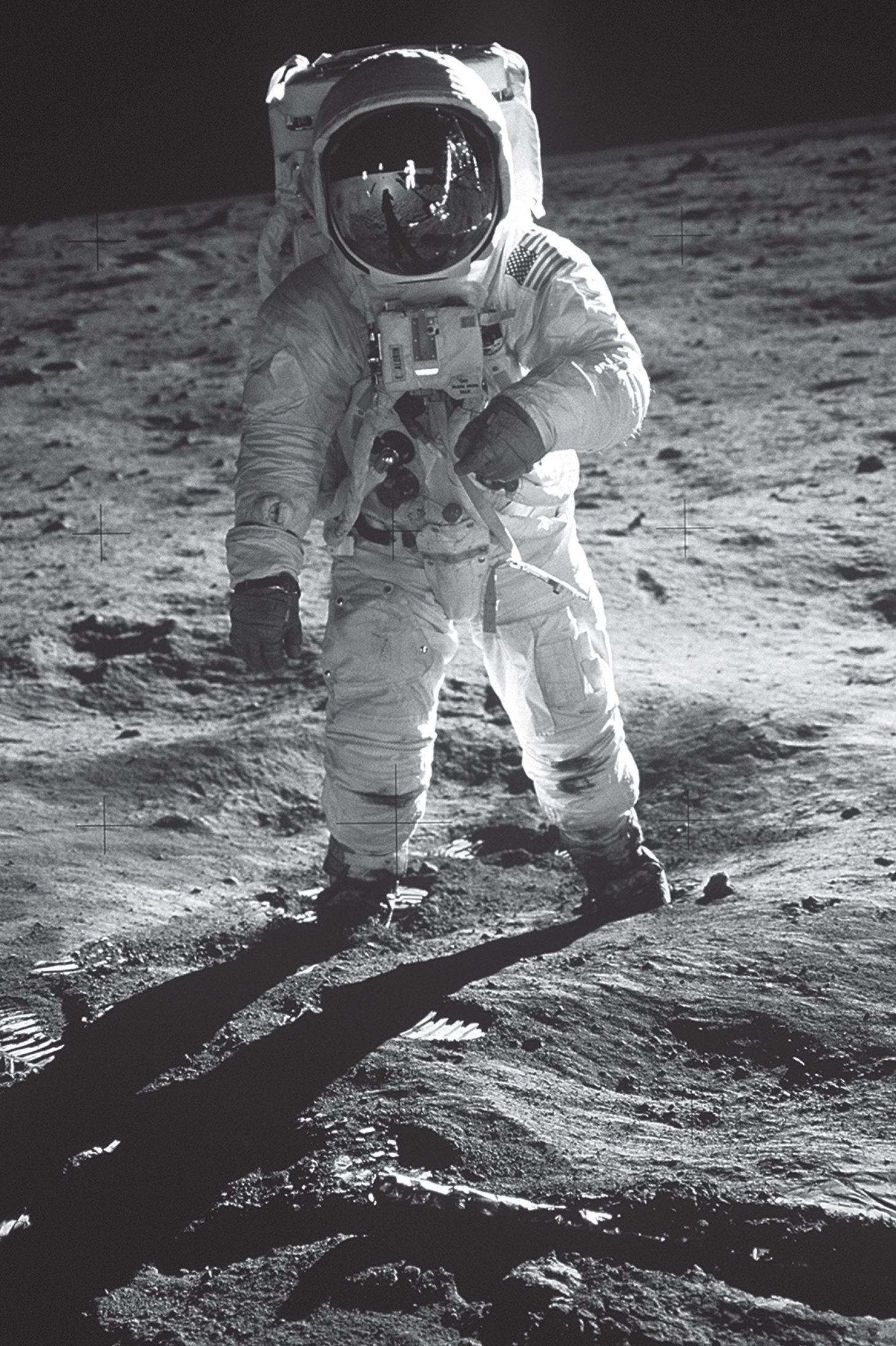
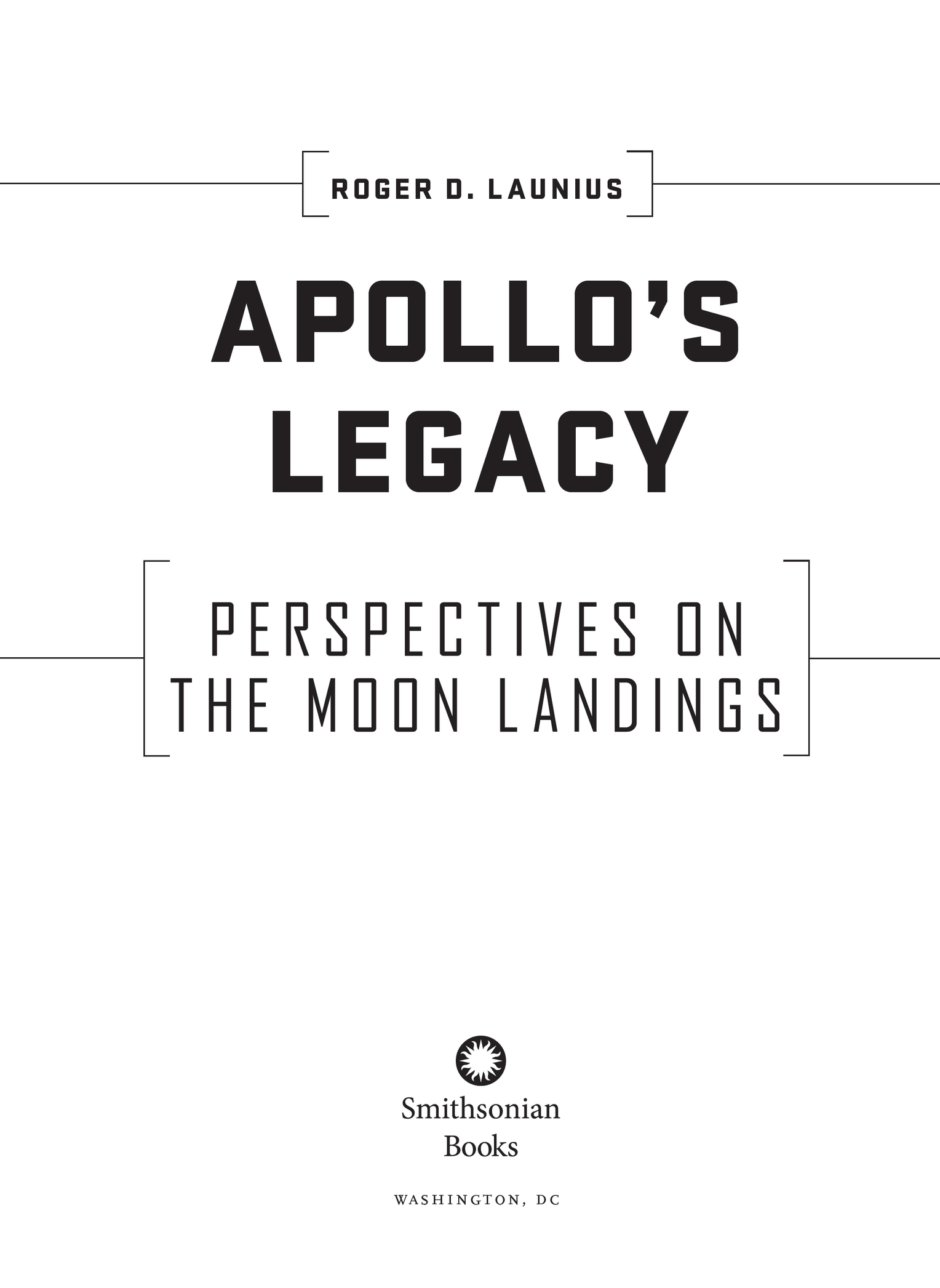
 PROLOGUE
PROLOGUE 